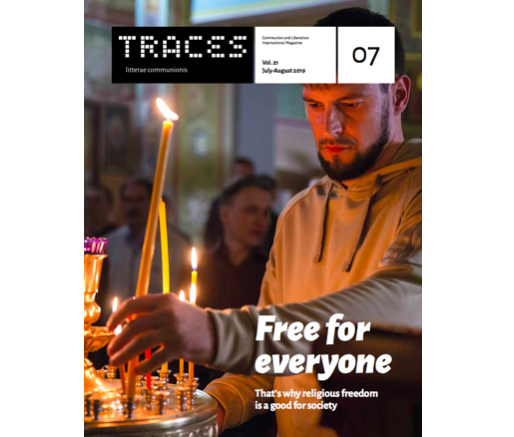
Traces N.7, July/August 2019
Living Human SpacesThis time the prompt comes from a document published by the Vatican on April 29, “Religious Liberty for the Good of All,” the fruit of over four years of work by the International Theological Commission.
This is not just a text for experts, but a great help for realigning many crucial factors in the midst of the chaos that surrounds us.
The reason is simple: only in a relationship with a meaning do we find a compass able to orient our lives. Without it, we are abandoned to confusion. Only if this meaning has a face that transcends what we can see and touch, if in some way it is God, whatever name we may give it, can everything take up an appropriate form again.
This holds for life in society, where only religious freedom well understood and equally well cherished makes it possible to restore God and Caesar, religion and politics, to their rightful places without the mutual manipulations that in the course of history have already shown all their dramatic limits but today threaten to reemerge. But it also holds for our personal lives, because only in an acknowledged and embraced bond with the Mystery does each thing return to where it should be and take on its right proportion; this does not mean that everything is reduced, but rather brought back to its right dimension, without the daily failures of judgment that would have us expect satisfaction, the fulfillment of our desires, and at times even salvation from our families, work, friends, and politics itself–all very important things, but too small to respond to our heart if separated from their ultimate destiny, even when they go the way we think they should, and all the more when they do not.
For this reason, so that people are not “condemned to nonsense and desperation,” as the theologian Javier Prades observes in the dialogue you will find in this issue, there need to be “living human spaces where people can tell each other about their experience of the meaning of being born, living, working, loving, and dying.” They are a good for everyone.
This is the reason our summer journey starts out with religious freedom and then proceeds to the Meeting of Rimini, where many of these questions will return. The theme, “Your Name Was Born from What You Gazed Upon,” drawn from Karol Wojtyla’s poem about Veronica, poses the first question. In a relationship with an Other, our “I” finds its substance and our humanity blossoms, or rather, continually reblossoms. We will see this during the week in Rimini from August 18–24.
But in the meantime, the theme of the Meeting is the theme for this issue of Traces, exemplified also by the astonishing testimony of Fr. Pigi Bernareggi, who after a life spent as a missionary in Brazil recounts the great newness he never lost sight of. Enjoy reading, and have a great summer!